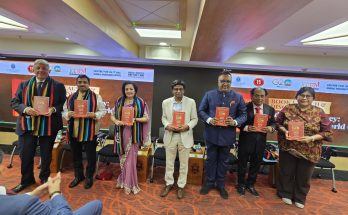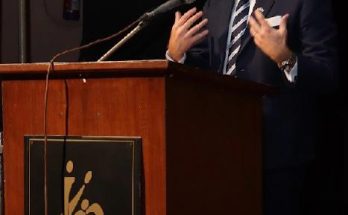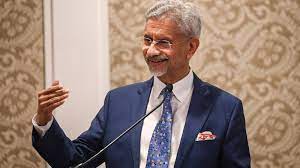 SINGAPORE: Amid festering anxieties about China’s hegemonic ambitions, India’s Prime Minister Narendra Modi has unveiled a soaring statesman-like vision of a “new Indo-Pacific,” region which is open, pluralistic, inclusive and is not limited to exclusive membership.
SINGAPORE: Amid festering anxieties about China’s hegemonic ambitions, India’s Prime Minister Narendra Modi has unveiled a soaring statesman-like vision of a “new Indo-Pacific,” region which is open, pluralistic, inclusive and is not limited to exclusive membership.
In a defining foreign policy speech which has been much anticipated by the international strategic community, Mr Modi enunciated his all-encompassing view of the Indo-Pacific, a region marked by intense geopolitical contestation, and underscored that India does not consider the Indo-Pacific region an exclusive club.
On the contrary, in his nearly hour-long address at the prestigious Shangri-La Dialogue, the region’s premier defence and security dialogue forum, in Singapore on June 1, Mr Modi said that the Indo-Pacific includes “includes all nations in this geography” as well as other countries that have stakes in the area. Mr Modi is the first Indian prime minister to deliver the keynote address at the Sahangri La dialogue, which underscores the growing salience of the Indo-Pacific region in India’s strategic calculus.
“Inclusiveness, openness and ASEAN centrality and unity, therefore, lie at the heart of the new Indo-Pacific. India does not see the Indo-Pacific Region as a strategy or as a club of limited members.”
“Nor as a grouping that seeks to dominate. And by no means do we consider it as directed against any country. A geographical definition, as such, cannot be. India’s vision for the Indo-Pacific Region is, therefore, a positive one. And, it has many elements.”
ASEAN-led Indo-Pacific
The Indian leader underscored the centrality of ASEAN in shaping an inclusive Indo-Pacific region and India’s Act East policy in actualising this vision. “Southeast Asia is at its centre. And, ASEAN has been and will be central to its future. That is the vision that will always guide India, as we seek to cooperate for an architecture for peace and security in this region,” he said.
Mr Modi also amplified on his maritime worldview, as encapsulated in his doctrine of SAGAR – Security and Growth for All and underscored India’s vital interests in sustaining peace and stability in the Indian Ocean.
Managing China: Competition yes, but no disputes
 In a delicately nuanced 3362-word address, attended by a record number of defence ministers and the crème de la crème of the strategic community, Mr Modi rejected any notion of containment and stressed that “India’s vision of the Indo-Pacific region is a positive one” that seeks to foster peace, stability and prosperity in a free and open Indo-Pacific region. “By no means do we see it directed at any country,” he said. “New Delhi’s engagement in the area will be inclusive.
In a delicately nuanced 3362-word address, attended by a record number of defence ministers and the crème de la crème of the strategic community, Mr Modi rejected any notion of containment and stressed that “India’s vision of the Indo-Pacific region is a positive one” that seeks to foster peace, stability and prosperity in a free and open Indo-Pacific region. “By no means do we see it directed at any country,” he said. “New Delhi’s engagement in the area will be inclusive.
In incisive remarks that seem to have been aimed at China and possibly at abrasive unilateralism seen under the Trump presidency, Mr Modi said: “So, each nation must ask itself: Are its choices building a more united world, or forcing new divisions? It is a responsibility that both existing and rising powers have.”
“Competition is normal. But, contests must not turn into conflict; differences must not be allowed to become disputes,” he said in a formulation that India has used in the context of China’s aggressive behaviour seen during the 72-day long stand-off on the contested Doklam plateau in the summer of 2017.
The relationship between India and China is key to a positive future, he said. “I firmly believe that Asia and the world will have a better future when India and China work together in trust and confidence, sensitive to each other’s interests,” he said.
Alluding to his informal summit meeting with Chinese President Xi Jinping in Wuhan in April this year, Mr Modi said that the two countries “have displayed maturity and wisdom in managing issues and ensuring a peaceful border.”
Asia of cooperation, not rivalry
 Alluding to a troubled world teetering on the edge of uncertainty and marked by “unsettled questions and unresolved disputes; contests and claims; and clashing visions and competing models,” he warned against a “return to the age of great power rivalries,” Mr Modi said: “Asia of rivalry will hold us all back. Asia of cooperation will shape this century.”
Alluding to a troubled world teetering on the edge of uncertainty and marked by “unsettled questions and unresolved disputes; contests and claims; and clashing visions and competing models,” he warned against a “return to the age of great power rivalries,” Mr Modi said: “Asia of rivalry will hold us all back. Asia of cooperation will shape this century.”
Underlining his commitment to “a democratic and rules-based international order, in which all nations, small and large, thrive as equal and sovereign,” Mr Modi said: “We will work with others to keep our seas, space and airways free and open; our nations secure from terrorism; and our cyber space free from disruption and conflict.”
The Indian leader ended his magisterial oration on a cautiously optimistic note and invoked the civilizational ethos of the region rooted in Buddhism and the philosophy of Vedas to express hope that the region will find its way above divisions and narrow interests. “This world is at a crossroad There are temptations of the worst lessons of history. But, there is also a path of wisdom. It summons us to a higher purpose: to rise above a narrow view of our interests and recognise that each of us can serve our interests better when we work together as equals in the larger good of all nations. I am here to urge all to take that path.”
Author Profile

- Manish Chand is Founder-CEO and Editor-in-Chief of India Writes Network (www.indiawrites.org) and India and World, a pioneering magazine focused on international affairs. He is CEO/Director of TGII Media Private Limited, an India-based media, publishing, research and consultancy company.
Latest entries
 India and the WorldMarch 3, 2024India-Denmark Connect: Red carpet for Indians to Red Sea cooperation
India and the WorldMarch 3, 2024India-Denmark Connect: Red carpet for Indians to Red Sea cooperation India and the WorldFebruary 17, 2024Munich Security Conference: Jaishankar, Blinken focus on Red Sea, Middle East
India and the WorldFebruary 17, 2024Munich Security Conference: Jaishankar, Blinken focus on Red Sea, Middle East India and the WorldFebruary 14, 2024Munich Security Conference report: Migration, war top security threats
India and the WorldFebruary 14, 2024Munich Security Conference report: Migration, war top security threats India and the WorldJanuary 23, 2024With “Ram to Rashtra” mantra, Modi consecrates Ram temple for national renewal
India and the WorldJanuary 23, 2024With “Ram to Rashtra” mantra, Modi consecrates Ram temple for national renewal







